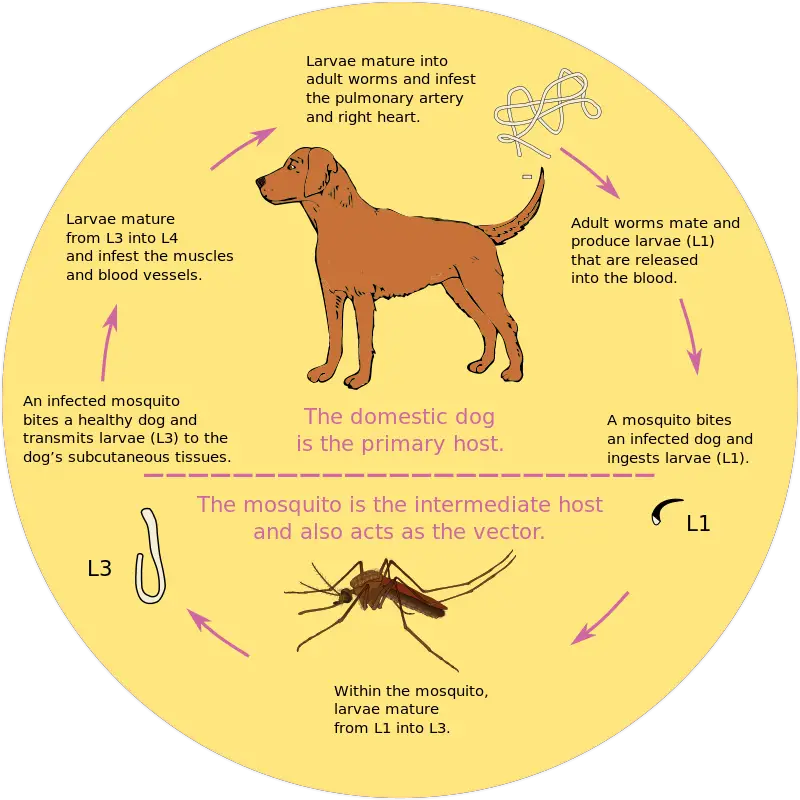Most pet owners have heard of heartworm treatment in cats and dogs, but unfortunately, most are unaware of how serious heartworm disease can be and how important it is to prevent it. Heartworm prevention for dogs without vet prescription can be an important way to treat your dog.
What are the dangers of heartworm and how to prevent them?
The heartworm can attack both dogs and cats.
Although until a few decades ago it was a rare occurrence in the world, nowadays it is everywhere, so prevention is important for all pets, in all parts of the world.
The disease caused by the heartworm originates from a parasite called Dirofilaria immitis.
What is Heartworm?
The parasite is transmitted to dogs and cats through mosquitoes.
Direct transmission from a cat or dog to another pet is not possible. When a mosquito bites an infected dog or cat, a parasite called Microfilariae enters the mosquito.
The microfilariae mature inside the mosquito and are then transmitted to another cat or dog when the mosquito bites that animal. When the parasite is transmitted to a new animal in this way, it can mature into worms and migrate to the heart of a cat or dog.
Once the parasite migrates to the heart, the worms can multiply and make new Microfilariae.
Microfilariae circulate in the bloodstream and can be detected by targeted blood analysis.
However, microfilariae cannot be detected in the blood before the animal has been infected for at least 6-8 months.

During these 6-8 months, the worms increase and grow in the main blood vessels and heart.
Worms can eventually grow so large that they stop the flow of blood to the heart and lungs, causing a heart attack and death.
Pets that live only in the house can also get heartworm.
Apart from being a serious disease in itself, heartworms are very problematic to treat and complications can stem from therapy to eliminate adult worms.
In some cases, even an attempt to treat heartworm can cause the death of a cat or dog.
14 most common diseases in Weims and how to treat them
Due to all the above, regular application of effective preventive preparations can save the life of your pet.
What are the preventive measures for the treatment of Heartworm
It is important to keep in mind that animals that live exclusively in the house can also be bitten by mosquitoes.
We recommend this great book if you want to learn more about this vicious disease and thus better protect your dog Nature’s Untold Answer to Toxic Heartworm Treatment & Prevention
It is recommended that all pets be treated with preventatives (and/or have their heartworm tested regularly, annually).
There are several preparations on our market that repel mosquitoes and thus prevent it. These are topical preparations (applied to the skin of the animal):
– for Broadline cats
– for dogs Frontline TRI-ACT and NexGard SPECTRA.
Be sure to consult your veterinarian
It is useful to visit your veterinarian to talk about the lifestyle of your cat or dog and possible risk factors, in addition to giving blood for analysis, and before applying the preparation for prevention.
As giving preventive preparations to an already infected animal can cause health problems, testing is an important item in the overall heartworm prevention program.
How often is it necessary to take the hunting dog to the vet
A blood test confirms that your pet does not have adult heartworms in it and that it is ready to start or continue with prevention.
Blood tests should be performed annually, even in animals that regularly receive preventive preparations.
While heartworm disease in the early stages may be asymptomatic, indicators of the presence of heartworm in dogs include:
– Coughing
– Avoidance of activity and fatigue after physical activity
– Hesitation before activities
– Decreased appetite
– Weight loss
– Heart problems
– Accumulation of fluid in the abdomen
– Cardiovascular collapse
Heartworm in cats
Cats show less noticeable signs of heartworm infection because they usually do not have worms that multiply in their heart muscle.
Despite that, cats can still get heartworm diseases with severe complications, and they should also be on preventive measures.
Symptoms of heartworm infection in cats include:
– Cough
– Asthma-like symptoms
– Occasional vomiting
– Loss of appetite
– Weight loss
– Sudden fainting
– Sudden death
Although it is a preventable disease, only about 50% of dogs and significantly fewer cats, in areas where heartworm is common, are actually on preventative preparations, and not all animals receiving preventative medications receive them monthly or as usual. already recommended by the manufacturer.
Talk to your veterinarian about prevention, because certain types of preventive preparations can work better on some cats and dogs than others, depending on the lifestyle.
For example, a dog that swims regularly may not have the maximum effect of a topical preparation because it will weaken due to water.
Again, Warn, Visit your vet!!!
Remember that only a veterinarian can do an analysis that will appropriately identify, diagnose, and make the best plan for regulating and preventing heartworm disease in your dog or cat.
Conclusion
The heartworm can attack both dogs and cats.
The parasite is transmitted to cats and dogs through mosquitoes.
It is important to know that even pets that stay only in the house can be bitten by mosquitoes, so in fact, all dogs and cats should be treated with preventive preparations and tested annually for heartworms.
↓ ↓ ↓ ↓ ↓
If you want to read more interesting facts you can join the discussion on our Facebook group, and you can follow us on Instagram or Pinterest
↓ ↓ ↓ ↓ ↓
↑ ↑ ↑ ↑ ↑

